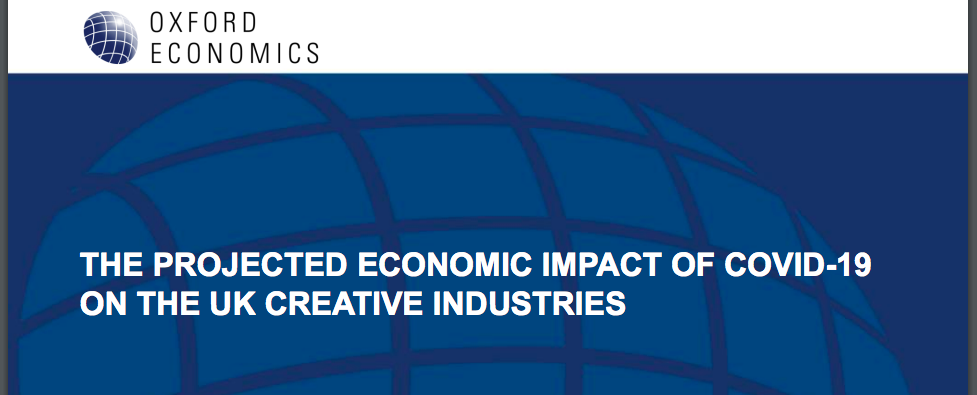
The Creative Industries Federation has today warned of a “cultural catastrophe” as newly commissioned research from Oxford Economics reveals that the UK’s creative industries are on the brink of devastation. The UK’s creative sector was previously growing at five times the rate of the wider economy, employing over 2 million people and contributing £111.7 billion to the economy – more than the automotive, aerospace, life sciences and oil and gas industries combined.
The new report, The Projected Economic Impact of Covid-19 on the UK Creative Industries, projects that the creative sector will be hit twice as hard as the wider economy in 2020, with a projected GVA shortfall of £29 billion. Many creative sub-sectors are expected to lose more than half their revenue and over half of their workforce. Despite the Job Retention Scheme, the report projects that 119,000 permanent creative workers will be made redundant by the end of the year. The impact on employment is set to be felt twice as hard by creative freelancers with 287,000 freelance roles expected to be terminated by the end of 2020.
Regionally, London is projected to experience the highest drop in creative industries GVA, seeing a £14.6 billion (25%) shortfall. However, Scotland and the North East are expected to be hit hardest relatively, with projected GVA decreases of 39% (£1.7 billion) and 37% (£400 million) respectively. 1 in 6 (112,000) creative jobs could be lost in the capital, with the West Midlands expected to be most impacted in relative terms, with 2 in 5 creative jobs in the region projected to be lost. The North West and South West will also be hit hard, with both projected to lose around a third of creative jobs. This could represent a major setback to the levelling up agenda, particularly in light of research from Cambridge Econometrics, released by the PEC/Creative England this week, which suggests that, based on recovery from the 2008 recession, creative industries outside of London may take much longer to ‘bounce back’ than those in the capital.
Key statistics:
- Creative industries GVA projected to fall by £29 billion (-25%), with the creative industries being hit twice as hard as the wider UK economy*
*OBR estimate for UK GDP growth this year is -12.8%.
- Creative industries projected to lose 406,000 jobs and £74 billion in revenue (-30%).
- Music, performing and visual arts projected to lose £11 billion in revenue (-54%) and 57% of jobs (178,000) with theatres, recording studios and concert venues remaining closed.
- The music industry is projected to lose at least £3 billion in GVA (50%) and 60% of jobs (114,000), with the sector being hit hard by the collapse in live music and touring.
- Theatre projected to lose £3 billion in revenue (61%) and 26% of permanent jobs (12,000), although this estimate only takes into account current cancellations and does not account for the reluctance of audiences to return to venues (only 20% would return on opening night according to a survey by Indigo). Further research from UK Theatre/SOLT shows that, without further intervention, job losses in theatre across permanent and freelance roles is likely to number over 200,000 (over 70%).
- Film, TV, video, radio and photography could lose £36 billion in revenue (-57%), with the sector projected to lose 42% of jobs (102,000) as social distancing constraints affect cinema capacity and the cost of filmmaking.
* The BFI reported last month that 65% of film and high-end TV production had to be put on hold during the shutdown, although film and television production is now restarting following the introduction of extensive social distancing guidance.
- Postproduction and VFX could lose £827 million in revenue (-58%).
- Radio projected to lose £186 million in revenue (-21%) as it sees a decline in advertising.
- Crafts could lose £513 million in revenue (53%), with the craft economy projecting to lose 47% of jobs (58,000) as many craft practitioners experience the fallout of closed workshops and retail spaces.
- Design and designer fashion within creative industries could lose £2 billion in revenue (-58%) and 30% of jobs (51,000). When we look at the reach of design across the economy, the risk is far greater, with a potential GVA drop of £37 billion (-47%) and over 300,000 jobs projecting to be lost.
- Advertising and market research could see their turnover drop by £19 billion (-44%) projecting job losses of 26% (49,000), with spend on advertising expected to drop by £4 billion in 2020 (-17%).
- Publishing could lose £7 billion in revenue (-40%) and 26% of jobs (51,000), affected by the closure of bookshops and decline of print sales.
- Museums and galleries could lose £743 million in revenue (-9%) and 5% of jobs (4,000), with the impact being mitigated by being able to reopen in July under social distancing constraints.
- Architecture projected to lose £1 billion in revenue (-24%) and 2% of jobs (1,800 jobs).
Regional breakdown:
- London is projected to lose 16% of its creative jobs (109,800) and see a 25% (£14.6 billion) drop in creative industries GVA whilst the South East is projected to lose 24% of its creative jobs (82,000) and see a 25% (£4.7 billion) drop in creative industries GVA. Of the 406,000 creative jobs expected to be lost, 47% are projected to be in London and the South East.
- The East of England is projected to lose 25% of its creative jobs (42,000) and see a 31% drop (£1.9 billion) in creative industries GVA.
- Scotland is projected to lose 6% of its creative jobs (7,000) but see the largest percentage drop in creative industries GVA (39% / £1.7 billion).
- The North West is projected to lose 30% of its creative jobs (48,000) and see a 30% (£1.4 billion) drop in creative industries GVA .
- The West Midlands is projected to be hit hardest in terms of job losses, with 43% of creative jobs projected to be lost (51,000) and a creative industries GVA shortfall of 32% (£1.4 billion).
- The South West is projected to lose 28% of its creative jobs (43,000) and see a 29% (£1.3 billion) drop in creative industries GVA.
- The East Midlands is projected to lose 1% of its creative jobs (1,300) but see a 31% (£800 million) drop in creative industries GVA, owing to a greater use of the furloughing scheme. However, the region is projected to be amongst the hardest hit once the Job Retention Scheme is withdrawn.
- The North East is projected to lose 3% of its creative jobs (2,000) but see a 37% (£400 million) drop in creative industries GVA, owing again to a greater use of the furloughing scheme. However, like the East Midlands, the region is projected to be hit harder once the Job Retention Scheme is withdrawn.
- Northern Ireland is projected to lose 20% (6,000) of its creative jobs and see a 23% (£300 million) drop in creative industries GVA.
- Wales is projected to lose 26% (15,000) of its creative jobs and see a 10% (£100 million) drop in creative industries GVA .
- Yorkshire is projected to see a 3% (£100 million) drop in creative industries GVA.
The report, released today, follows the Creative Industries Federation’s open letter to government in April calling for urgent funding for the creative sector, which was signed by over 500 leading figures from the creative industries and beyond. In May, the Creative Industries Federation joined forces with UKHospitality and the Association of Leading Visitor Attractions to call for an extension of the Job Retention Scheme and Self Employed Income Support Scheme, as well as the introduction of targeted grant support for those sectors who will be last to return to work.
Caroline Norbury MBE, CEO, Creative Industries Federation, said:
“With the economic impact of Covid-19 hitting hard, the role of our creative industries has never been more critical. As well as being a huge driver of economic growth in every part of the UK, our creative and cultural sectors bring communities together, they employ millions and are at the heart of our soft power. These are the industries of the future: highly innovative, resistant to automation and integral to both our cultural identity and the nation’s mental health. We’re about to need them more than ever.
Our creative industries have been one of the UK’s biggest success stories but what today’s report makes clear is that, without additional government support, we are heading for a cultural catastrophe. If nothing is done, thousands of world-leading creative businesses are set to close their doors, hundreds of thousands of jobs will be lost and billions will be lost to our economy. The repercussions would have a devastating and irreversible effect on our country.
We urgently need a Cultural Renewal Fund for those in the creative sector who will be hit hardest, including those industries who will be latest to return to work, those businesses unable to operate fully whilst maintaining social distancing and those creative professionals who continue to fall through the gaps of government support measures. We must also avoid a cliff-edge on vital measures such as the Job Retention Scheme and the Self Employed Income Support Scheme, which have been a financial lifeline for many parts of the creative industries and cannot be cut off overnight.
It is time to both imagine and engineer our future. We will need our creative industries to do that. They are too important to ignore.
Download the full report here.
Oxford Economics: The Projected Economic Impact of Covid-19 on the UK Creative Industries
The Oxford Economics report, The Projected Economic Impact of Covid-19 on the UK Creative Industries, was commissioned by the Creative Industries Federation, in collaboration with the Advertising Association, AIM, Animation UK, Arts Council England, AudioUK, Bectu, BPI, British Fashion Council, BFI, Crafts Council, Design Council, Directors UK, Equity, Greater London Authority, GC Business Growth Hub, Liverpool City Region Combined Authority, Museums Association, Musicians Union, The Network of European Museum Organisations, Publishers Association and PPA, Radiocentre, RIBA, SOLT/UK Theatre, Ukie, UK Music, UK Screen Alliance, Welsh Government and West Midlands Combined Authority.
The analysis draws from responses to the Creative Industries Federation’s survey of over 2,000 creative organisations and freelancers on the projected impact of the coronavirus pandemic on creative industries’ employment, income and freelance contracts (Coronavirus Creative Industries Impact Survey, Creative Industries Federation, March-April, 2020). These responses were complemented with Oxford Economics’ industry forecast to make assumptions on the quarterly profile of these developments. Where possible, data from individual trade bodies was employed to further inform these estimates. The results are based on the assumption that the Job Retention Scheme (furloughing) will be employed for as long as it is in place.
Cambridge Econometrics: The Changing Spatial Distribution of Employment in the Creative Industry Clusters in England, 1921-2018
Published on Tuesday 16th June, 2020, this paper, commissioned jointly by the Policy and Evidence Centre and Creative England, looks to understand creative industries growth trends in English LEPs from 1991-2018 by mapping and measuring the geographical concentration and patterns of creative industries employment over time. The paper shows that following the global financial crash, we saw an accelerated trend towards greater concentration of creative businesses in London.
Creative Industries Federation
The Creative Industries Federation is an independent, not for profit, membership organisation which represents, champions and supports the UK’s creative industries. Through our wide network of creative organisations, businesses and individuals, our influential policy and advocacy work and our support services, we connect creative businesses and individuals with the money, markets, government and the opportunities they need to thrive. www.creativeindustriesfederation.com
Oxford Economics
Oxford Economics was founded in 1981 as a commercial venture with Oxford University’s business college to provide economic forecasting and modelling to UK companies and financial institutions expanding abroad. Since then, we have become one of the world’s foremost independent global advisory firms, providing reports, forecasts, and analytical tools on more than 200 countries, 250 industrial sectors, and 7,000 cities and regions. Our best-in-class global economic and industry models and analytical tools give us an unparalleled ability to forecast external market trends and assess their economic, social, and business impact.
Headquartered in Oxford, England, with regional centres in New York, London, Frankfurt, and Singapore, Oxford Economics has offices across the globe in Belfast, Boston, Cape Town, Chicago, Dubai, Dublin, Hong Kong, Los Angeles, Melbourne, Mexico City, Milan, Paris, Philadelphia, Stockholm, Sydney, Tokyo, and Toronto. We employ 400 full-time staff, including more than 250 professional economists, industry experts, and business editors—one of the largest teams of macroeconomists and thought leadership specialists. Our global team is highly skilled in a full range of research techniques and thought leadership capabilities, from econometric modelling, scenario framing, and economic impact analysis to market surveys, case studies, expert panels, and web analytics.
Oxford Economics is a key adviser to corporate, financial, and government decision-makers and thought leaders. Our worldwide client base now comprises over 1,500 international organizations, including leading multinational companies and financial institutions; key government bodies and trade associations; and top universities, consultancies, and think tanks.
Advertising Association
The Advertising Association promotes the role and rights of responsible advertising and its value to people, society, businesses and the economy. Responsible businesses understand that there is little point in an advertisement that people cannot trust. That’s why, over 50 years ago, the Advertising Association led UK advertising towards a system of independent self-regulation which has since been adopted around the world. There are nearly thirty UK trade associations representing advertising, media and marketing. Through the Advertising Association they come together with a single-voice when speaking to policy-makers and influencers.
Bectu
Bectu, a sector of Prospect Union, is the UK’s media and entertainment union, representing more than 30,000 staff, contract and freelance workers in creative industries including broadcasting, cinema, film, digital media, independent production, leisure, IT and telecoms, theatre and the arts. Bectu aims to protect jobs, win new recognition agreements, improve pay and conditions of service.
Design Council
Design Council’s mission is to make life better by design. We work with people to create better places, better products and better processes, all of which lead to better performance. ?We commission pioneering evidence-based research, develop ground-breaking programmes and deliver influencing and policy work to demonstrate the power of design and how it impacts three key areas of the economy: business innovation, places and public services. We bring together non-designers and designers – from grassroots to government – and share with them our design expertise to transform the way they work.
Directors UK
Directors UK is the professional association of UK screen directors. It is a membership organisation representing the creative, economic and contractual interests of over 7,000 members — the majority of working TV and film directors in the UK. Directors UK collects and distributes royalty payments and provides a range of services to members including campaigning, commercial negotiations, legal advice, events, training and career development. Directors UK works closely with fellow organisations around the world to represent directors’ rights and concerns, promotes excellence in the craft of direction and champions change to the current landscape to create an equal opportunity industry for all.
Professional Publishers Association (PPA)
The Professional Publishers Association (PPA) has been synonymous with magazine and business media for over 100 years. Today our membership is made up of modern, multi-platform media businesses carving out a future defined by trusted, quality content. We represent, champion and support around 200 companies, ranging from consumer magazine publishers to business-to-business data and information providers, customer magazine publishers and smaller independents. Whether on the page, online, or face-to-face, our members create professional, inspirational and influential media content that engages and entertains audiences. As the voice of professional publishers for over 100 years, the PPA is committed to ensuring our members have the tools to evolve into dynamic, multi-platform media companies. Our work today is built around core four pillars – championing content, sharing knowledge, celebrating success, and reducing risk to support the broad spectrum of companies within the vibrant UK’s publishing sector. Any company or association with the common commitment of working towards a prosperous multi-platform media industry should join us. We bring our members together to unlock valuable connections that foster creativity and commercial successes. We also welcome suppliers to the industry as Associate Members. www.ppa.co.uk| @PPA_Live
RIBA
The Royal Institute of British Architects (RIBA) is a global professional membership body that serves its members and society in order to deliver better buildings and places, stronger communities and a sustainable environment. Follow @RIBA on Twitter for regular updates.
UK Theatre / Society of London Theatre (SOLT)
SOLT and UK Theatre are the trade associations and members’ organisations representing the interests of those engaged in the production and presentation of medium to large-scale dramatic and lyric theatre in the UK. Their memberships are drawn from both subsidised and commercial theatre. The combined box office income of SOLT and UK Theatre’s membership was more than £1.28 billion across London and the rest of the UK, with 34 million tickets sold in 2018. SOLT represents approximately 230 London-based producers, theatre owners and managers, including all the major subsidised theatrical organisations in London. UK Theatre represents approximately 240 theatres, concert halls, dance companies, producers and arts centres throughout the UK. UK Theatre also operates as a professional association, supporting over 1,400 individuals working professionally in theatre and the performing arts in the UK
UK Music
UK Music is the collective voice of the UK commercial music industry and represents the interests of the recorded, published and live arms of the music business. UK Music promotes the interests of artists, record labels, music publishers, songwriters, composers, lyricists, musicians, managers, producers, promoters, venues, collection societies and the live music sector.
UK Screen Alliance
UK Screen Alliance in partnership with Animation UK, is the trade association that represents Visual Effects (VFX), TV & Film Studios, Post-Production, Production Service Companies and Animation; all key parts of the UK’s Film, TV, and Advertising sectors. Its membership comprises over 100 leading employers in this sector.
GC Business Growth Hub (www.businessgrowthhub.com)
GC Business Growth Hub, part of The Growth Company, helps businesses at all stages of their growth journey with a broad range of services delivered by its experts, as well as public and private sector partners. These services include one-to-one and peer-to-peer business support, events, specialist programmes and funding. GC Business Growth Hub was launched in 2011 and has helped thousands of start-ups, scale-ups and established businesses across Greater Manchester.
The Growth Company is a UK-wide not-for-profit economic development agency that seeks to generate inclusive growth in the country’s economy by creating jobs and improving lives. It offers a wealth of services that support growth among individuals, businesses, cities and regions. For more information, please visit www.growthco.uk





